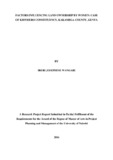| dc.description.abstract | There has been progress in terms of legislation of land ownership and women rights on the same subject in Kenya and a number of Non-Governmental Organizations and Civil Society Organizations are in the fore front promoting women land ownership. It is noted that women play an integral part in food production for their families however, land tenure system in the rural areas discriminates against women hence very few women own land. The overall purpose of this study was to establish various interventions that the state and community can adopt to ensure that women gain support in accessing owning and controlling land, an essential factor of production. The objectives of this study were to assess the influence of access to information on women land rights on women land ownership, to examine the influence of land administration patterns on women land ownership, analyse the social economic impacts of women land rights and assess the role of culture in realizing women land rights. The study focused on the factors that promote women land rights by examining the global and national context in the quest to realize women land and property rights. Relevant literature was reviewed to ascertain the state of women land ownership and study gaps were identified. The study employed descriptive survey research design that was both quantitative and qualitative in nature adopting a participatory approach. The target population was 46390. Primary data was obtained using questionnaires, Focus group discussion guides, key informant guides and literature review including observation. Statistical Package for Social Sciences was used to analyze data. 396 respondents participated through random sampling. The data output is presented in form of tables. The research findings show that access to information influences women land ownership, it also came out clear that land administration patterns contribute to realization of women land ownership, it was also found out that socio-economic as well as cultural factors influence women land ownership. Other factors that emerged included the fact that some women did not want to own land feeling that it will break family ties and the fact that women get married therefore they should not inherit land in their fathers‘ homes. It also emanated that regular training on women land rights was necessary since a good number of respondents said they did not know any women land right and even the constitutional provisions were not understood thus simpler versions should be provided. However, the same was attributed to the retrogressive culture still existing in the society. Women empowerment issue also came up as a factor leading to improved society hence allowing them to own land is one of the indicators of empowerment. Based on the findings the research recommends that to promote women land ownership, the following should be done: Training on women land rights right from primary schools to the local communities and this means that there should be inclusion of the study of women land rights in the primary school curriculum, Non-Governmental Organizations and Faith Based Organizations together with Civil Society Organizations dealing in women rights should concentrate on awareness creation and always refresh the target group as often as possible to make it a norm, the Government and NGO world should look for a way litigation can be made free to women seeking justice on land rights and that the law makers should come up with a law prohibiting the cultural practices that hinder women from land ownership not just as a paper but sensitize people on it and ensure it is followed. The study concludes with confidence level of 95% that women land ownership is influenced by factors as access to information, land administration patterns, socio-economic and cultural factors. | en_US |



